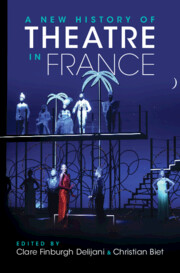Book contents
- A New History of Theatre in France
- A New History of Theatre in France
- Copyright page
- Dedication
- Contents
- Illustrations
- Contributors
- Acknowledgements
- Notes on the Text
- Introduction
- Chapter 1 The Performing Arts in Fifteenth- and Sixteenth-Century France
- Chapter 2 Drama during the Wars of Religion
- Chapter 3 Drama before Standardization
- Chapter 4 Neo-Classical Tragedy
- Chapter 5 Molière, a Man of the Stage?
- Chapter 6 Theatres as Economic Concerns
- Chapter 7 Seventeenth-Century Printed Theatre
- Chapter 8 Non-Official Eighteenth-Century Stages
- Chapter 9 The Expanded Theatre of the French Revolution
- Chapter 10 Nineteenth-Century Melodrama, Vaudeville and Entertainment
- Chapter 11 New Approaches to Women Actors and Celebrity in Nineteenth-Century France
- Chapter 12 Extended Romanticism in the Extended Nineteenth Century
- Chapter 13 Poetry in Action, 1945–1968
- Chapter 14 Performance and Installation Art
- Chapter 15 Twentieth- and Twenty-First-Century Theatre Directing
- Chapter 16 Political Theatre in France (1954–2020)
- Chapter 17 Liberating Third World Theatre
- Chapter 18 Francophone Theatre-Makers in France
- Chapter 19 Migration in Modern and Contemporary Playwriting
- Chapter 20 An Interview with Éric Ruf
- Chapter 21 An Interview with Magali Mougel
- Chapter 22 An Interview with Phia Ménard
- Bibliography
- Index
- References
Chapter 19 - Migration in Modern and Contemporary Playwriting
Uprooting and Rerouting
Published online by Cambridge University Press: 22 October 2024
- A New History of Theatre in France
- A New History of Theatre in France
- Copyright page
- Dedication
- Contents
- Illustrations
- Contributors
- Acknowledgements
- Notes on the Text
- Introduction
- Chapter 1 The Performing Arts in Fifteenth- and Sixteenth-Century France
- Chapter 2 Drama during the Wars of Religion
- Chapter 3 Drama before Standardization
- Chapter 4 Neo-Classical Tragedy
- Chapter 5 Molière, a Man of the Stage?
- Chapter 6 Theatres as Economic Concerns
- Chapter 7 Seventeenth-Century Printed Theatre
- Chapter 8 Non-Official Eighteenth-Century Stages
- Chapter 9 The Expanded Theatre of the French Revolution
- Chapter 10 Nineteenth-Century Melodrama, Vaudeville and Entertainment
- Chapter 11 New Approaches to Women Actors and Celebrity in Nineteenth-Century France
- Chapter 12 Extended Romanticism in the Extended Nineteenth Century
- Chapter 13 Poetry in Action, 1945–1968
- Chapter 14 Performance and Installation Art
- Chapter 15 Twentieth- and Twenty-First-Century Theatre Directing
- Chapter 16 Political Theatre in France (1954–2020)
- Chapter 17 Liberating Third World Theatre
- Chapter 18 Francophone Theatre-Makers in France
- Chapter 19 Migration in Modern and Contemporary Playwriting
- Chapter 20 An Interview with Éric Ruf
- Chapter 21 An Interview with Magali Mougel
- Chapter 22 An Interview with Phia Ménard
- Bibliography
- Index
- References
Summary
Clare Finburgh Delijani’s chapter accounts for a significant and growing strain of theatre that stages the central role played by migration and transnational, mobile identities not just in France but also across the world. Today around 30 per cent of France’s population comprises either migrants from its former colonies or their postmigrant descendants, demonstrating the key significance of migration to French society and culture. Using Édouard Glissant’s notion of ‘relation identity’, which expresses ‘the conscious and contradictory experience of contacts among cultures’, Finburgh Delijani demonstrates how the exiles, immigrants and refugees featuring in the plays she examines represent the postcolonial diversity of the French nation. With close analysis of Bernard-Marie Koltès’s Le Retour au desert (Return to the Desert, 1988), Wajdi Mouawad’s Incendies (Scorched, 2003) and Estelle Savasta’s Traversée (Going Through, 2019), Finburgh Delijani exposes how characters illustrate the uprooting of belonging, legitimacy and identity by the often violent severance of migration and exile. However, the trauma that characters suffer – which cannot be underestimated – is counterbalanced by the relational, transnational and cosmopolitan citizens they are able to become.
Keywords
- Type
- Chapter
- Information
- A New History of Theatre in France , pp. 366 - 390Publisher: Cambridge University PressPrint publication year: 2024

